Connect With Us
Blog
Items filtered by date: April 2025
Caring for Your Feet as You Age
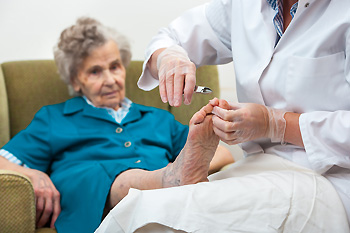
As people age, elderly foot care becomes increasingly important to maintain mobility and overall health. One of the most essential aspects of foot care is moisturizing, as older skin tends to become drier and more prone to cracking. Applying a gentle foot cream or lotion can help keep the skin soft and prevent issues like calluses or fissures. Proper toenail trimming is also vital to avoid discomfort or infections. Nails should be trimmed straight across and not too short, as cutting too close can lead to ingrown nails. Regular inspection of the feet is important to identify any changes such as redness, swelling, or signs of infection. Wearing well-fitted shoes that provide support can further enhance comfort and prevent injuries, promoting better foot health as you age. If you have noticed any changes in your feet or if you have developed one or more foot conditions, it is suggested that you promptly contact a podiatrist who can treat various foot conditions, and offer practical advice on how to care for your feet.
Proper foot care is something many older adults forget to consider. If you have any concerns about your feet and ankles, contact Dr. Eddy Caldwell from Foot Care of Northeast Arkansas, P.A.. Our doctor can provide the care you need to keep you pain-free and on your feet.
The Elderly and Their Feet
As we age we start to notice many changes in our body, but the elder population may not notice them right away. Medical conditions may prevent the elderly to take notice of their foot health right away. Poor vision is a lead contributor to not taking action for the elderly.
Common Conditions
- Neuropathy – can reduce feeling in the feet and can hide many life-threatening medical conditions.
- Reduced flexibility – prevents the ability of proper toenail trimming, and foot cleaning. If left untreated, it may lead to further medical issues.
- Foot sores – amongst the older population can be serious before they are discovered. Some of the problematic conditions they may face are:
- Gouging toenails affecting nearby toe
- Shoes that don’t fit properly
- Pressure sores
- Loss of circulation in legs & feet
- Edema & swelling of feet and ankles
Susceptible Infections
Diabetes and poor circulation can cause general loss of sensitivity over the years, turning a simple cut into a serious issue.
If you have any questions please feel free to contact our office located in Jonesboro, AR . We offer the newest diagnostic and treatment technologies for all your foot and ankle needs.
What Your Feet Can Reveal About Liver Health
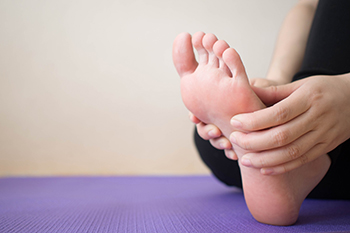
The feet can reflect underlying liver conditions through several noticeable changes. Yellowing of the skin and nails, known as jaundice, is a common sign of liver dysfunction and may first appear subtly in the toes or soles. Swelling in the feet and ankles can result from fluid buildup when the liver is not processing fluids properly. The appearance of spider veins on the feet or lower legs may also indicate poor liver function due to changes in blood flow. Itchy feet can be caused by a buildup of bile salts in the bloodstream, often linked to liver issues. Clubbing of the toes, where the tips become rounded and the nails curve downward, may point to long-standing liver disease. If you have any of the above symptoms, it is suggested that you consult a podiatrist who can provide appropriate treatment and discuss the connections between possible liver issues.
When dealing with systemic disease of the feet, it is extremely important to check the affected areas routinely so that any additional problems are caught quickly. If you have any concerns about your feet and ankles contact Dr. Eddy Caldwell from Foot Care of Northeast Arkansas, P.A.. Our doctor will assist you with all of your podiatric needs.
Systemic Diseases of the Feet
Systemic diseases affect the whole body, and symptoms usually are displayed in the feet. This condition can make a patient’s ability to walk unbearable. Systemic diseases include gout, diabetes mellitus, neurological disorders, and arthritis.
Gout – is caused by an excess of uric acid in the body. Common symptoms include pain, inflammation, and redness at the metatarsal/phalangeal joint of the base big toe. Gout can be treated by NSAIDs to relieve pain and inflammation, and other drugs that lower the acid levels in the body.
Diabetes mellitus – is an increase in the level of blood sugar that the body cannot counteract with its own insulin. Failure to produce enough insulin is a factor in Diabetes.
Diabetes of the Feet
Diabetic Neuropathy – may lead to damaged nerves and affect the feet through numbness and loss of sensation.
Peripheral Vascular Disease – can restrict the blood flow to the feet, and often times lead to amputation of the feet.
If you have any questions please feel free to contact our office located in Jonesboro, AR . We offer the newest diagnostic and treatment technologies for all your foot and ankle needs.
Reduce Flat Feet Discomfort With Custom Orthotics
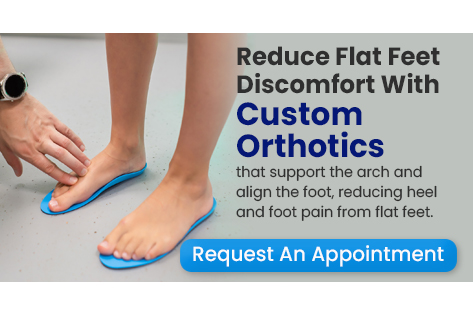
Flat feet? Rise above the discomfort with Custom Orthotics. Specifically designed to support the arch and align the foot, Custom Orthotics can be a game-changer for those with flat feet. They help in distributing weight evenly, preventing undue stress and potential pain. Walk, run, or stand with newfound confidence, knowing your feet have the support they've been missing. Want to explore the benefits of Custom Orthotics tailored for flat feet? Contact us today!
What Are Plantar Warts?
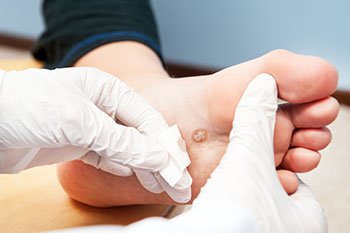
Plantar warts are growths that appear on the soles of the feet, caused by the human papillomavirus, or HPV. They often develop in areas of pressure, like the heel or ball of the foot, and can sometimes combine to form a condition known as mosaic warts. Mosaic warts are clusters of multiple warts that spread out across a larger area, creating a patchy, rough surface. These warts can cause pain, especially when walking or standing for long periods. They often look like small, rough bumps with black dots in the center, which are blood vessels. The area susrrounding the wart may become hardened and calloused. A podiatrist can diagnose and treat plantar warts through various methods, including cryotherapy or freezing, laser treatment, and minor surgery. They may also provide topical treatments and advice on preventing the spread of the virus. If you have this condition, it is suggested that you schedule an appointment with a podiatrist for appropriate care.
Plantar warts can be very uncomfortable. If you need your feet checked, contact Dr. Eddy Caldwell from Foot Care of Northeast Arkansas, P.A.. Our doctor will assist you with all of your foot and ankle needs.
About Plantar Warts
Plantar warts are the result of HPV, or human papillomavirus, getting into open wounds on the feet. They are mostly found on the heels or balls of the feet.
While plantar warts are generally harmless, those experiencing excessive pain or those suffering from diabetes or a compromised immune system require immediate medical care. Plantar warts are easily diagnosed, usually through scraping off a bit of rough skin or by getting a biopsy.
Symptoms
- Lesions on the bottom of your feet, usually rough and grainy
- Hard or thick callused spots
- Wart seeds, which are small clotted blood vessels that look like little black spots
- Pain, discomfort, or tenderness of your feet when walking or standing
Treatment
- Freezing
- Electric tool removal
- Laser Treatment
- Topical Creams (prescription only)
- Over-the-counter medications
To help prevent developing plantar warts, avoid walking barefoot over abrasive surfaces that can cause cuts or wounds for HPV to get into. Avoiding direct contact with other warts, as well as not picking or rubbing existing warts, can help prevent the further spread of plantar warts. However, if you think you have developed plantar warts, speak to your podiatrist. He or she can diagnose the warts on your feet and recommend the appropriate treatment options.
If you have any questions please feel free to contact our office located in Jonesboro, AR . We offer the newest diagnostic and treatment technologies for all your foot and ankle needs.
Heel Pain in the Morning?
The Role of Orthotics in Managing Cerebral Palsy
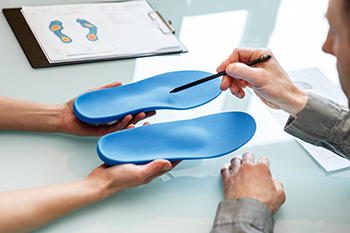
Orthotics play a vital role in improving mobility and comfort for individuals with cerebral palsy by providing support, alignment, and stability. Cerebral palsy often affects muscle tone and coordination, leading to difficulties with walking and balance. Orthotic devices help correct foot positioning, reduce muscle strain, and enhance overall function by promoting a more natural gait pattern. They assist in distributing weight evenly, preventing excessive pressure on specific areas that may lead to discomfort or deformities. Custom orthotics can be designed to meet individual needs, offering improved control and reducing the risk of falls. By enhancing stability and support, orthotics contribute to greater independence and mobility for individuals with cerebral palsy, allowing them to move with increased confidence and comfort in their daily activities. If cerebral palsy is part of your life, it is suggested that you are under the care of a podiatrist who can educate you on custom-made orthotics that may help to manage this condition.
Custom orthotics and shoe inserts are not just for cushioning the soles; they are about supporting the foundation of our body - our feet. The advantages extend far beyond immediate relief from discomfort. These personalized solutions, that Our doctor can prescribe, can significantly impact a person’s posture, alleviate pain in various parts of the body, and even enhance athletic performance.
As we lace up our shoes each day, having the right support can make a world of difference. Custom orthotics are like tailored suites for our feet, offering a bespoke solution to address our unique biomechanical needs. They provide stability where it is lacking, correct imbalances, and ensure that every step is a confident and pain-free one.
Custom orthotics and shoe inserts offer long-term health benefits. By addressing issues such as overpronation or underpronation, heel pain, plantar fasciitis, etc. orthotics can help prevent injuries and mitigate the progression of existing conditions. It’s an investment not just in the present, but in the future health of your feet and consequently, your overall well-being.
If you have any questions please contact our office located in Jonesboro, AR . We offer the newest diagnostic and treatment technologies for all your foot and ankle needs.
How Peripheral Neuropathy Affects the Feet
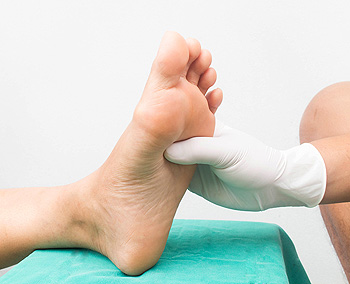
Peripheral neuropathy is a condition involving damage to the peripheral nerves, often affecting the feet, toes, and ankles. Patients may experience numbness, tingling, burning sensations, or sharp, stabbing pain that tends to worsen at night. As the sensory nerves in the feet become damaged, there is a reduced ability to feel temperature changes or pain, which can increase the risk of unnoticed injuries, infections, and foot ulcers. Over time, this nerve damage can also weaken the muscles in the feet and ankles, resulting in instability and difficulty walking. Diabetes is a common cause of peripheral neuropathy, and long-term high blood sugar levels can further harm nerves and the small blood vessels that supply them. Other contributing factors include alcohol misuse, nutritional deficiencies, and certain medical conditions. A podiatrist can help manage symptoms, reduce the risk of complications, and monitor nerve health through regular foot exams. In more advanced cases, surgery may be necessary to relieve pressure on specific nerves. If you have symptoms of peripheral neuropathy affecting your feet, it is suggested that you schedule an appointment with a podiatrist for an exam and ongoing treatment.
Neuropathy
Neuropathy can be a potentially serious condition, especially if it is left undiagnosed. If you have any concerns that you may be experiencing nerve loss in your feet, consult with Dr. Eddy Caldwell from Foot Care of Northeast Arkansas, P.A.. Our doctor will assess your condition and provide you with quality foot and ankle treatment for neuropathy.
What Is Neuropathy?
Neuropathy is a condition that leads to damage to the nerves in the body. Peripheral neuropathy, or neuropathy that affects your peripheral nervous system, usually occurs in the feet. Neuropathy can be triggered by a number of different causes. Such causes include diabetes, infections, cancers, disorders, and toxic substances.
Symptoms of Neuropathy Include:
- Numbness
- Sensation loss
- Prickling and tingling sensations
- Throbbing, freezing, burning pains
- Muscle weakness
Those with diabetes are at serious risk due to being unable to feel an ulcer on their feet. Diabetics usually also suffer from poor blood circulation. This can lead to the wound not healing, infections occurring, and the limb may have to be amputated.
Treatment
To treat neuropathy in the foot, podiatrists will first diagnose the cause of the neuropathy. Figuring out the underlying cause of the neuropathy will allow the podiatrist to prescribe the best treatment, whether it be caused by diabetes, toxic substance exposure, infection, etc. If the nerve has not died, then it’s possible that sensation may be able to return to the foot.
Pain medication may be issued for pain. Electrical nerve stimulation can be used to stimulate nerves. If the neuropathy is caused from pressure on the nerves, then surgery may be necessary.
If you have any questions, please feel free to contact our office located in Jonesboro, AR . We offer the newest diagnostic and treatment technologies for all your foot care needs.
Causes and Symptoms of Broken Blood Vessels in Feet
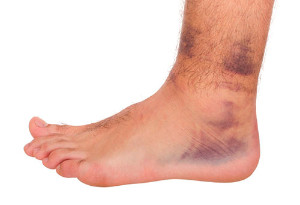
Broken blood vessels in the foot, also known as petechiae or bruising, occur when small blood vessels beneath the skin rupture. This can happen due to trauma or injury, such as stubbing the foot or wearing tight footwear. Other causes include excessive pressure on the foot, certain medical conditions that affect blood clotting, or even prolonged standing. Symptoms of broken blood vessels include visible red, purple, or blue spots on the skin, which may expand or change color over time as the blood is reabsorbed. In some cases, swelling, pain, or tenderness may accompany the bruising. If you have any of the above symptoms, it is suggested that you consult a podiatrist who can determine what the cause is and offer appropriate treatment.
Foot Pain
Foot pain can be extremely painful and debilitating. If you have a foot pain, consult with Dr. Eddy Caldwell from Foot Care of Northeast Arkansas, P.A.. Our doctor will assess your condition and provide you with quality foot and ankle treatment.
Causes
Foot pain is a very broad condition that could be caused by one or more ailments. The most common include:
- Bunions
- Hammertoes
- Plantar Fasciitis
- Bone Spurs
- Corns
- Tarsal Tunnel Syndrome
- Ingrown Toenails
- Arthritis (such as Gout, Rheumatoid, and Osteoarthritis)
- Flat Feet
- Injury (from stress fractures, broken toe, foot, ankle, Achilles tendon ruptures, and sprains)
- And more
Diagnosis
To figure out the cause of foot pain, podiatrists utilize several different methods. This can range from simple visual inspections and sensation tests to X-rays and MRI scans. Prior medical history, family medical history, and any recent physical traumatic events will all be taken into consideration for a proper diagnosis.
Treatment
Treatment depends upon the cause of the foot pain. Whether it is resting, staying off the foot, or having surgery; podiatrists have a number of treatment options available for foot pain.
If you have any questions, please feel free to contact our office located in Jonesboro, AR . We offer the newest diagnostic and treatment technologies for all your foot care needs.






